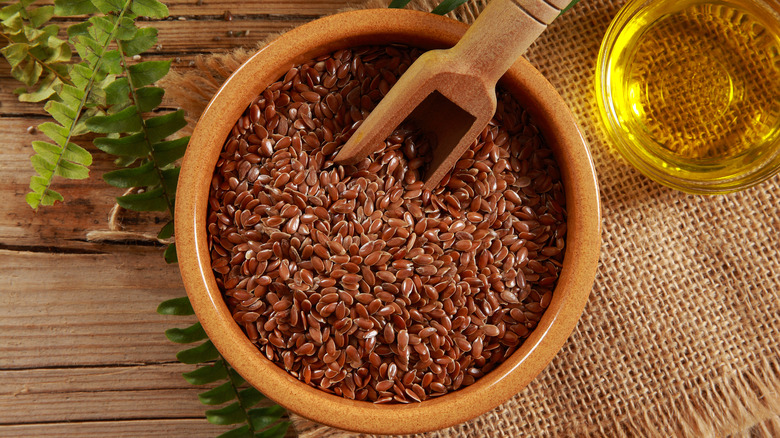Is Flaxseed Good For You?
When you think of flaxseeds, you most likely picture them sprinkled over an acai bowl or mixed into a bag of granola, but these crunchy seeds are more than just a way to add texture to other foods (via Real Simple). They're also a nutritional powerhouse food. Derived from the flax plant, flaxseeds are one of the oldest cultivated crops in the world, dating back to 3000 B.C. While the flax plant has long been used to make clothing and linens, its seeds are now used as an essential ingredient in many health foods and plant-based dishes.
That's because flaxseeds are nutrient-dense and packed full of essential vitamins and minerals. "Flaxseeds are high in fiber, which helps to fill you up more quickly, keep you full longer, and aid in digestion and heart health," Meghan Sedivy, a registered dietitian and health and lifestyle expert at Fresh Thyme Market, told Real Simple. They're also a great source of protein and essential omega-3 fatty acids, like alpha-linolenic acid (ALA), which can help benefit your overall health.
Health benefits of flaxseed
Due to their robust nutritional content, flaxseeds have been linked to a variety of potential health benefits. For instance, eating flaxseeds on a regular basis may help improve cardiovascular health (via Medical News Today). According to the American Heart Association, consuming more fiber, lignans, and omega-3 fatty acids can help reduce the risk of cardiovascular disease. Research has also shown that flaxseeds can help lower LDL or bad cholesterol levels in the body.
Rich in insoluble fiber, flaxseeds can keep skin and hair healthy, help aid digestion, prevent constipation, keep you regular, and help bulk up your stool, making it easier to pass through your colon. Flaxseeds may also reduce the risk of cancer. Studies have shown that the omega-3 fatty acids and lignans in flaxseeds may prevent certain types of cancer cells from growing and help slow the growth of some malignant tumors (via Medical News Today).


